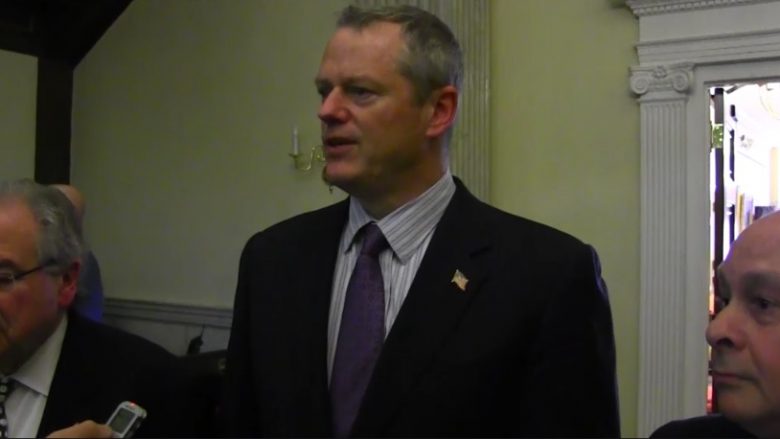Poll shows support for adding charters, rejecting legal pot
By NBP Staff | May 9, 2016, 20:55 EDT
 House Speaker Robert DeLeo, left, with Gov. Charlie Baker, center, and Senate President Stanley Rosenberg discuss issues with State House reporters Monday. (Image courtesy of State House News Service)
House Speaker Robert DeLeo, left, with Gov. Charlie Baker, center, and Senate President Stanley Rosenberg discuss issues with State House reporters Monday. (Image courtesy of State House News Service) BOSTON – Among potential ballot measures that may go before voters in November, raising the cap on charter schools won the most support in a recently released survey of Massachusetts voters.
The proposed initiative asks voters to allow the creation of up to 12 new charter schools each year, with emphasis on adding these publicly funded institutions in low-performing districts as measured by standardized tests. Almost 50 percent said they approve of lifting the cap, while 33 percent disapproved and 16 percent were undecided in the Boston Globe-sponsored survey from Suffolk University in Boston.
About 50 percent also said charter schools offer better options for parents and students, while about 32 percent said they strip resources from district schools. Another 4.4 percent said they do both.
The state Senate on April 7 voted to tie a gradual increase of a cap on charter school enrollment with new spending of more than $200 million a year on public education, but it is unclear whether the House of Representatives will take up a charter school bill of its own before the current legislative session ends, according to the State House News Service.
Massachusetts Gov. Charlie Baker, who supports lifting the cap on charter schools, has expressed concerns with the Senate measure.
Turning to another proposed ballot initiative, poll takers found more opposition than support for legalizing the retail sale of marijuana and cannabis products to people 21 and older. The proposal would also call for regulating the trade in ways similar to the oversight of alcohol sales.
The survey shows almost 46 percent oppose legalizing marijuana, compared with 43 percent who support it and 11 percent undecided.
Baker, House Speaker Robert DeLeo, Attorney General Maura Healey and Boston Mayor Marty Walsh are united in opposing legalization of the drug, which is illegal under federal law. Baker, Walsh and DeLeo recently launched the Campaign for a Safe and Healthy Massachusetts in an attempt to persuade voters that making retail sales of pot legal isn’t the right move for the state.
On a related question – whether people should be able to cultivate marijuana legally – 50 percent said no, compared with 40 percent who supported home-growing rights.
Several states, including Colorado and Washington, have made retail cannabis sales to adults legal. The decision in both those states was made through ballot initiatives similar to the one that may reach Bay State voters in November, backed by the Campaign to Regulate Marijuana Like Alcohol.
The survey also asked likely voters whether they support or oppose passage of a bill that would “protect the civil rights of transgender people, including their right to use the restroom that conforms to their gender identity.” About 53 percent said they support passage while 30 percent opposed it and 15 percent were undecided, the poll results show.
But the framing of the question suggests that opposing passage of a “bathroom bill” pending in the state legislature implies denying some people their civil rights, while opponents question why guaranteeing access to sex-segregated facilities based on gender identity rather than physical anatomy trumps the privacy rights of everyone else. The Senate plans to debate one of two versions of the bill on Thursday.
Both versions of the bills would let transgender people use public facilities such as restrooms and changing rooms that align with their gender identity rather than their physical anatomy. They were sent to the full Legislature for consideration last month.
Baker has declined to say whether he would sign or veto such a bill should it reach his desk. Recently, he said he believes “people should use the restroom facility they feel comfortable using.”
Another issue pending before lawmakers, whether to amend the state Constitution to impose a 4 percent tax surcharge on residents earning $1 million or more in a year, received strong support, at almost 70 percent, in the poll. Just 24 percent oppose the move, which will be the subject of a Constitutional Convention next week.
The so-called millionaire tax must be supported by lawmakers in order to advance to the next legislative session and ultimately to the 2018 ballot. The earliest it could take effect would be 2019.
The amendment is expected to be the only matter considered at the May 18 convention. Amendments must be filed by 5 p.m. on May 12.
On other issues, the poll showed Baker still enjoys sky-high ratings, with 71 percent saying they approve of the job the governor is doing and 66 percent giving him a favorable rating.
While 57 percent believe the state economy is headed in the right direction, compared with 24 percent who said it’s on the wrong track, jobs scored highest in importance among issues facing the governor. The second most important was the drug abuse crisis gripping the state, followed by education.
The telephone survey of 500 likely voters from May 2 to May 5 had a margin of error of 4.4 percentage points.











